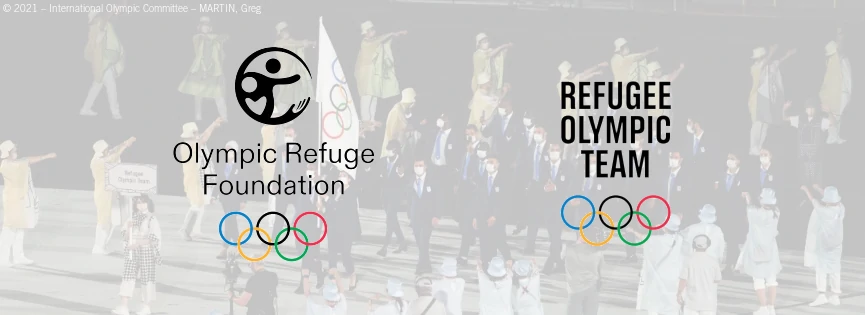Main content
Olympic Refuge Foundation and the IOC Refugee Olympic Team 2022 Princess of Asturias Award for Sports

In the words of IOC President Thomas Bach, the Olympic Refuge Foundation and the IOC Refugee Olympic Team, created in 2017 and 2015, respectively, by the International Olympic Committee (IOC) and the United Nations High Commissioner for Refugees (UNHCR) –1991 Prince of Asturias Award for International Cooperation–, aim to serve as “a symbol of hope for all the world’s refugees”, to raise awareness regarding one of the most important crises facing the international community, and to use sport as a channel for humanitarian aid, cooperation and development of people affected by conflicts at an international level.
The Olympic Refuge Foundation was created by the IOC, in collaboration with UNHCR, in 2017, with the commitment to support the protection and sporting and personal development of displaced athletes, over and above Olympic events. The Foundation works with international organizations, private sector companies, non-governmental organizations and other foundations to establish and promote cooperative programmes through sport. Protecting young people from violence and social exclusion, promoting access to education, health (with special attention to mental health in its latest initiatives) and sports practice are, among other goals, the main lines of the work strategy of the twelve programmes that the Foundation has launched since its creation, from which some two hundred thousand young people have already benefited. These projects have been carried out in eight countries: Colombia, Jordan, Kenya, Mexico, the Democratic Republic of the Congo, Rwanda, Turkey and Uganda. With the goal of reaching a million young beneficiaries by 2024, it continues to develop programmes. This year (2022), it has launched the “Terrains d’Avenir” project together with the French Ministry of Sports to help young refugees in France and is preparing others in countries such as Spain and the Netherlands. The Foundation also promotes the creation of networks and collaboration agreements that help implement its vision, such as the Sport for Refugees Coalition, in which more than eighty members participate, and the Olympic Refuge Foundation Think Tank, made up of international experts from the academic world, the healthcare sector, members of non-governmental organizations and refugees who analyse and fine tune the work of the Foundation and the role of sport as a tool for humanitarian aid. Thomas Bach is Chairman of the Foundation’s Board of Directors and Filippo Grandi, United Nations High Commissioner for Refugees, is its Vice Chairman. The Foundation is also responsible for the Refugee Olympic Team.
The IOC Refugee Olympic Team (officially known by its French acronym, EOR) is a delegation that participates in the Olympic Games made up of athletes who are refugees by reason of any conflict worldwide. It was created by the IOC in 2015, when this organization asked the different national committees to identify, in collaboration with UNHCR, refugee athletes whose sporting ability would potentially allow them to qualify for the Games, in order to offer them the possibility of doing so through the funding provided by Olympic Solidarity scholarships, an IOC aid project for athletes. The team has the same consideration as any other that participates in the sporting event. The EOR participated for the first time in the Rio de Janeiro 2016 Olympic Games. Of the forty-three pre-selected candidates, a list of ten athletes was finally chosen to form the team. These athletes came from Ethiopia, the Democratic Republic of the Congo, Syria and South Sudan, and participated in athletics, judo and swimming. Judoka Popole Misenga, from the Democratic Republic of the Congo, was their flag bearer at the opening ceremony. The flag that represents the EOR is the Olympic flag. The list of team members for the Tokyo 2020 Olympic Games (postponed due to the COVID-19 pandemic) was approved on 8th June 2021. The team was made up of twenty-nine athletes from thirteen national committees (chosen from an initial short-list of fifty-five), who competed in twelve disciplines. Yusra Mardini (Syrian swimmer) and Tachlowini Gabriyesos (Eritrean marathon runner) were the flag bearers at the opening ceremony. Thirty-six athletes from fifteen national committees have participated in twelve disciplines at the Paris 2024 Olympic Games. The team flag bearers at the opening ceremony were Syrian taekwondo athlete Yahya Al-Ghotany and Cameroonian boxer Cindy Ngamba, who won the bronze medal in boxing in the women’s 75 kg category
End of main content
